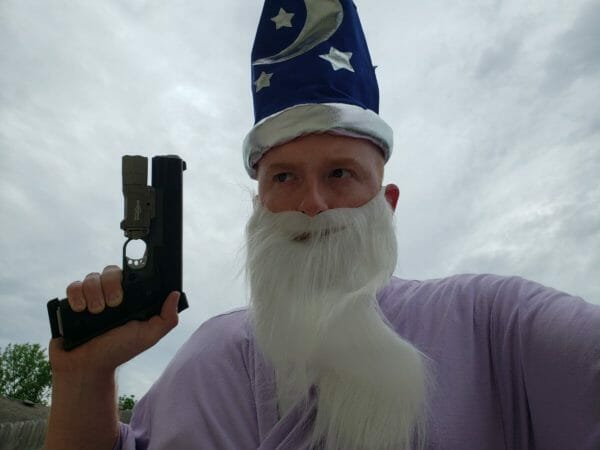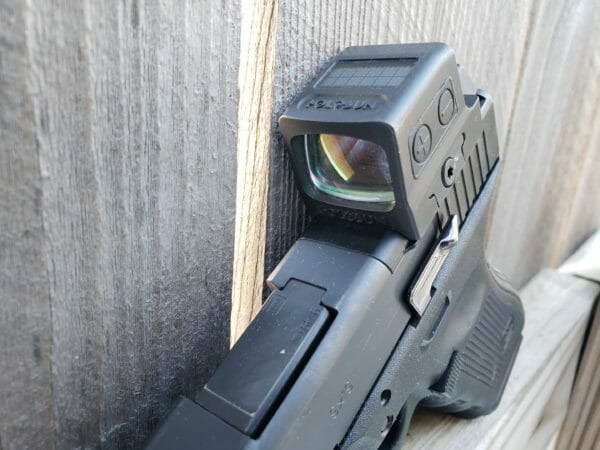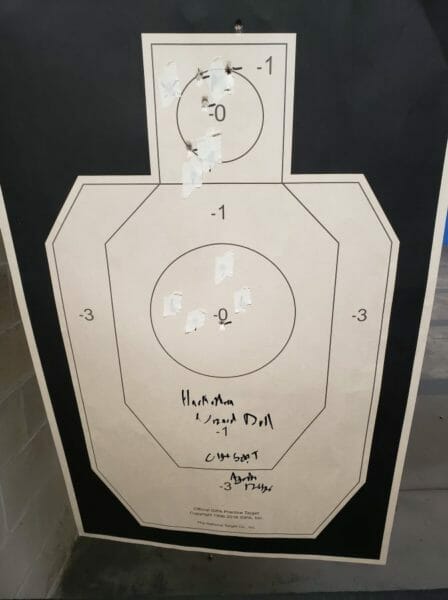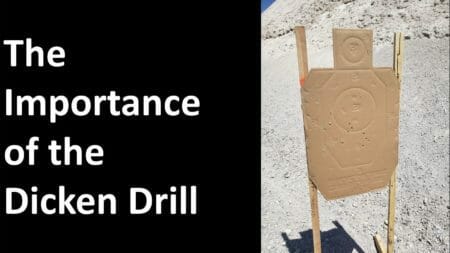
U.S.A. –-(AmmoLand.com)- Ken Hackathorn is one of the legends of the training and competition world. He is a founding member of both IPSC and IDPA, was one of the first instructors at Gunsite Academy, and has been instrumental in training both professional and private citizens in armed defense. One of his contributions I’ve been working on lately is Ken’s Wizard Drill. Ken considers the Wizard Drill to be his go-to for determining whether someone is simply armed or actually competent with their concealed pistol. A gold standard to see if you are capable of facing a lethal threat. So what exactly is the Wizard Drill?
Setting Up the Drill
The setup for this drill is fairly simple. You need a single target, calling for an IDPA silhouette, though similar targets such as an IALEFI-Q should suffice. Shooters will need their pistol in a concealment holster, a timer, one magazine, and five rounds of ammunition. If shooting with a pocket holster, shooters start with their hand on the gun in the pocket. No reloads are necessary.
There are no handicaps for optics, different calibers, or carry methods other than inside the waistband. Ken Hackathorn specifically uses his carry ammunition when shooting this drill, though I used FMJ ammo for my attempts.
Scoring the Wizard Drill
Scoring is a very binary pass or fail system. The par time for each string of fire is 2.5 seconds. Any shots that fall completely off the target is a fail. Any shots fired after the part-time is a DQ. So you have to get all of your hits in 2.5 seconds every time for the drill to count. In total, shooters can drop 2 points and still pass, giving you a little wiggle room for your body shots.

Additionally, this drill is designed to be fired cold, testing your on-demand performance, though practicing is certainly allowable.
Firing The Drill
There are four strings of fire in the Wizard Drill.
- Stage 1 – Distance is three yards. On the beep, draw and fire one round to the head, strong hand only. Par time is 2.5 seconds.
- Stage 2 – Distance is five yards. On the beep, draw and fire one round to the head, freestyle. Par time is 2.5 seconds.
- Stage 3 – Distance is seven yards. On the beep, draw and fire one round to the head, freestyle. Par time is 2.5 seconds.
- Stage 4 – Distance is ten yards. On the beep, draw and fire two rounds to the body, freestyle. Par time is 2.5 seconds.
My Results
I fired the Wizard Drill once per range session over the course of several weeks, for a total of five runs at the time of this writing. All shots were fired between January and February of 2022. For each run, I used my gen4 Glock 19 with a Holosun 509T red dot, carried AIWB in my KSG Armory Halcyon holster. Here are my results:
Stage 1) 3 yards, one head shot, strong hand only
- 2.30 clean
- 2.19 (-1)
- 1.89 clean
- 1.66 clean
- 1.76 clean
Stage 2) 5 yards, one head shot, freestyle
- 2.22 clean
- 2.02 clean
- 1.96 clean
- 1.75 (-1)
- 1.74 clean
Stage 3) 7 yards, one head shot, freestyle
- 2 09 (-1)
- 1 99 clean
- 2.18 clean
- 1.86 clean
- 1.83 clean
Stage 4) 10 yards, two body shots, freestyle
- 2.92 clean
- 2.33 clean
- 2.75 clean
- 2.21 (-1)
- 2.44 clean

After tallying up the results, I managed to pass three times in five attempts. As we can see by my times, I’m running a little faster than necessary more often than not, which occasionally results in me dumping a round. Most of these misses are just outside of the scoring ring, in the “-1” zone of the IDPA torso, with none leaving the target completely.
The 2.5-second par time seems a little generous at first, especially with a 1.50-1.75 second draw to first. But the reduced scoring zone of the head adds a little complexity for the first three strings. Shooting on a binary pass/fail system increases stress just slightly, especially when you’re used to drills graded on a percentage such as The Test or the Rangemaster Bullseye Course.
Final Thoughts on the Hackathorn Wizard Drill
This is a fantastic, low-round count drill that works a variety of skills in a short amount of time. We get strong hand only, draw to first shot, and follow-up shots all in one, with the ability to shoot this ten times with a single box of ammo. For those looking to take Ken’s advice and shoot it with their carry ammunition, five rounds is far more palatable to spend than what we get with many other drills.
While I still have some work to make this something I can pass on demand, I’m fairly pleased with my performance thus far. The Wizard Drill is certainly something that I plan to revisit and often recommend to other shooters. Try it for yourself and let us know how you perform on the range.
About Dan Reedy
Dan is an Air Force veteran, avid shooter, and dog dad. With a passion for teaching, he holds instructor certifications from Rangemaster, Agile Training & Consulting, and the NRA. He has trained with Darryl Bolke, Mike Pannone, Craig Douglas, among several other instructors, amassing over 400 hours of professional instruction thus far. In his spare time you’ll find him teaching handgun, shotgun, and less lethal classes.
Dan’s work has been published by Primer Peak, and The Kommando Blog, and he has been featured as a guest on Primary & Secondary.





“This is a fantastic, low-round count drill that works a variety of skills in a short amount of time.” Excellent. I will be adding the “Hackathorn Wizard Drill” into my next visit to the range. Bullets are expensive and precious, even reloads (try finding primers still), so low round count drills on occasion, combined with lots of laser pointer dry firing at home (I have the Strikeman dry fire practice system with the smartphone app) just make the most sense for a lot of us folks out here in poverty acres. (Many of us are not yet quite “too poor… Read more »
It’s definitely getting harder out there to get good practice in, glad this could be helpful. I appreciate the kind words!
you can buy primers from cci prices are about double before 55 per k large pistol
Is the Strikeman worth the investment? I have a Sight Mark bore laser that’s supposed to help zero your gun but the laser doesn’t chamber as well as it should. Two different things, but. Thanks for your response.
Good solid practice is always preferred to a larger volume of just shooting.
A good instructor can save one, a lot of money in wasted rounds.
By improving’s ones use of ammo.